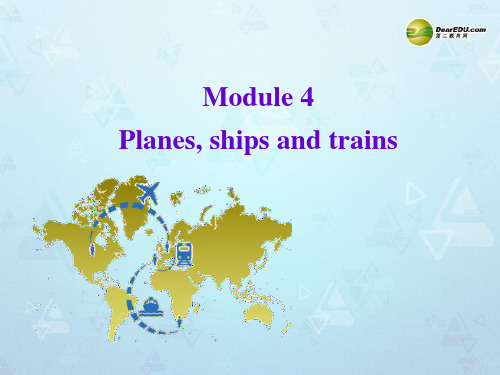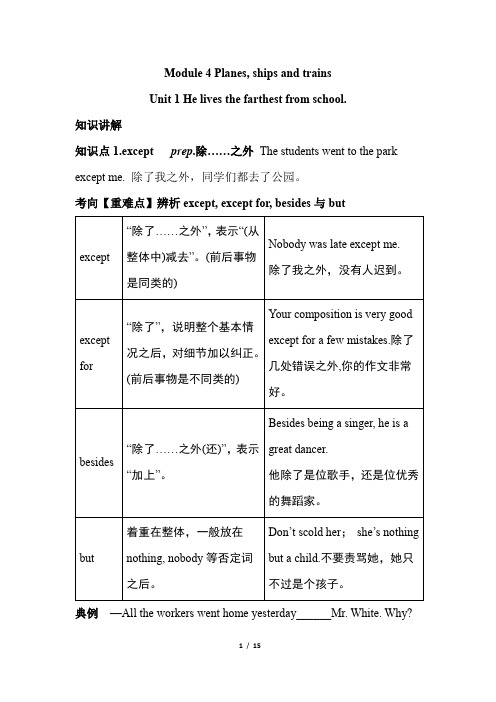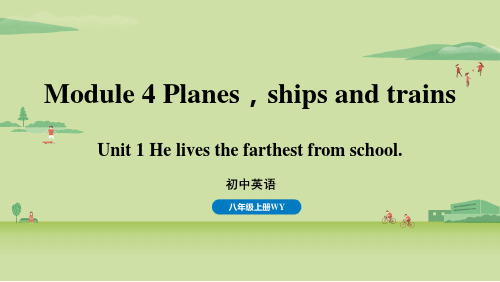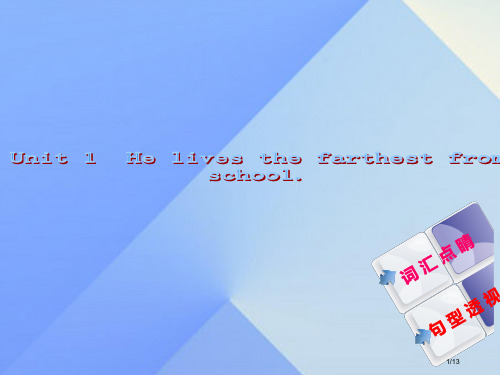八年级英语Module4Planes,shipsandtrainsUnit1Helivesthefarthestfromschool课时练(新版)外研版
- 格式:doc
- 大小:36.50 KB
- 文档页数:2



Module 4 Planes, ships and trains一、学习目标:A.单词和短语:road, accident, except, far, far away, crowded, choice, classmate, all the time, journey, book, outside, close, park, however, costB.交际用语:1. What happened?2. Don’t worry.3. —Who lives the closest to school?— Lingling lives closest.4. — What is the most comfortable way to go to school for Betty?— By taxi.5. —What’s the most expensive way to go to school?— Going by taxi is the most expensive.6. How do you get there?7. What’s the cheapest way?8. What’s the best way to get there?9. —What’s the cheapest way to travel from London to Paris?— The cheapest way is by coach.10. It’s the most comfortable way, but it’s the most expensive.11. He lives farthest from school.12. It is the fastest and the second cheapest.13. The more information, the better.二. 教学目标1. Function: Describing and comparing modes of transportation.2. Structure: Superlative adjectives and adverbs (-est, most); irregular superlatives.3. Skills: 1) Listening and understanding familiar topics (transportation)2) Comparing modes of transportation.3) Reading and finding specific transportation4) Writing a short passage comparing modes of transportation.4. Around the world: The longest railway5. Task: Making a holiday plan for a family trip to a city in China.三、重点及难点:Superlative adjectives and adverbs (-est, most); irregular superlatives.四、教学设计:Unit 1 He lives the farthest from school.ⅠTeaching modelListening and speakingⅡTeaching methodPWP approachⅢTeaching aims1. Key vocabulary: road, accident, except, far, far away, crowded, choice,classmate, close, all the time2. Key structures: superlative adjectives and adverbs (-est, most); irregularsuperlatives.3. Key sentences:1) What happened?2) Don’t worry.3) — Who lives the closest to school?— Lingling lives closest.4) — What is the most comfortable way to go to school for Betty?— By taxi.5) —What’s the most expensive way to go to school?— Going by taxi is the most expensive.ⅣTeaching aidsTape recorder, OHP, videoⅤTeaching StepsStep 1 Warming-up1. Work in pairs. Show some pictures and ask “How do you often go to school?”2. Look and say something about the pictures.3. Introduce the new words.4. Learn the new words.5. Read the new words.Step 2 Look and match.1. Ask the students to read the words in Activity 1.2. Look at the pictures in Activity 1 carefully.3. Now match the words with the pictures.5. Check the answers with the students.Keys: 1. train 2. ship 3. taxi 4. underground 5. busStep 3 Look, listen and match.1. Ask the students to read the words in Activity2.2. Play the recording and ask the students to listen to the recording carefully. T: Listen and match the words in the box with the pictures in Activity 1. You need to use one word more than once.3. Check the answers with the students.Step 4 Listen and read.1. Show some pictures, and ask the students to talk about them.2. Ask the students to read the conversation silently.3. Play the recording and ask the students to listen the conversation, and then answer the questions.1) How does Lingling go to school? Why?2) How do you think Betty will go to school?4. Read the conversation.5. Act it out.Step 5 Complete the table.1. Ask the students to read the conversation again.2. Now complete the table.3. Check the answers.Keys: by bus (by bike) by underground walks / on foot by bus Step 6 Complete the sentences.1. Ask the students to read the words in the box in Activity 4.2. Read the sentences.1) The _________________ way to go to school is by taxi.2) Tony lives the __________ from school.3) Lingling’s home is the _________ to school, so she always walks.4) For Betty, going to school by bike is the ______ choice.3. Complete the sentences with the correct words from the box.4. Check the answers:Keys: 1. most comfortable 2. farthest 3. closest 4. bestStep 7 Complete the sentences.1. Ask the students to read the words or expression in the box in Activity 5.2. Read through the sentences.1) All the students take the bus to school ___________ Sam.2) The ___________ train in the world is the Shanghai airport train.3) I saw a(n) __________ on the way to school yesterday.4) I do not take the bus to school because it is usually very ___________.3. Complete the sentences with the correct words from the box.4. Check the answers:Keys: 1. except 2. most modern 3. accident 4. crowdedStep 8 Pronunciation and speaking.1. Play the recording once without stopping.2. Play the recording again and ask the whole class to repeat.1) —Who lives the closest to school?— Lingling lives closest.2) — What is the most comfortable way to go to school for Betty?— By taxi.3. Ask the students to listen and mark the intonation.4. Now listen again and repeat.Step 9 Work in pairs.1. Ask the students to read the words or expression in the box in Activity 7.2. Read the example with the class.—What’s the most expensive way to go to school?— Going by taxi is the most expensive.3. Work in pairs.Step 10 Language points1. Maybe I should go to school by taxi. 或许我应该坐出租车去上学。


Module 4Planes, ships and trains Unit 1 He lives the farthest from school.一、短语翻译1. 远离2. 一直;不断地3. 上学迟到4. 乘出租车5. 小心点6. 和……一样二、单项选择1. — Who do you think sings __________ ?—Karen, she’s got the first place among the top ten singers.A. beautifullyB. more beautifullyC. the most beautifully2. —Hi, Jane! I’ll go to ShijiaZhuang next month.— Great! The glass bridge there is ________ than any other one in the world.A. longB. longerC. longestD. the longest3. We are happy to see our city is developing _______ these years than before.A. quicklyB. more quicklyC. very quicklyD. the most quickly4. The Nike is one of the ______ rivers in the world.A. longB. longerC. longestD. most longest5. — What do you think of your junior high school life?— I think it is one of ________ periods in my life.A. wonderfulB. more wonderfulC. much wonderfulD. the most wonderful三、根据语境用括号内所给单词的适当形式填空。

Module 4 Planes, ships and trainsUnit 1 He lives the farthest from school.ⅠTeaching modelListening and speakingⅢTeaching aims1. Key vocabulary: road, accident, except, far, far away, crowded, choice, classmate,close, all the time2. Key structures: Superlative adjectives and adverbs (-est, most); irregular superlatives.3. Key sentences:1) What happened?2) Don’t worry.3)—Who lives the closest to school?— Lingling lives closest.4) — What is the most comfortable way to go to school for Betty?— By taxi.5) —What’s the most expensive way to go to school?— Going by taxi is the most expensive.ⅣTeaching aidsTape recorder, OHP, videoⅤTeaching StepsStep 1 Warming-up1. Work in pairs. Show some pictures and ask “How do you often go to school?”2. Look at the pictures, and say something about the pictures.3. Introduce the new words.4. Learn the new words.5. Read the new words.Step 2 Look and match.1. Ask the students to read the words in Activity 1.2. Look at the pictures in Activity 1 carefully.3. Now match the words with the pictures.5. Ask the students to check their answer with a partner.6. Call back the answer from the whole class and check the answer.Keys: 1. train 2. ship 3. taxi 4. underground 5. busStep 3 Look, listen and match.1. Ask the students to read the words in Activity2.2. Play the recording and ask the students to listen to the recording carefully.3. Listen and match the words in the box with the pictures in Activity 1. You need to use one word more than once.4. Ask the students to check their answer with a partner.5. Call back the answer from the whole class and check the answer.Step 4 Listen and read.1. Show some pictures, and ask the students to talk about them.2. Ask the students to read the conversation silently.3. Play the recording and ask the students to listen and read the conversation.4. Read the conversation.5. Act it out.6. Learn “Everyday English”1) What happened?2) Do n’t worry.Step 5 Complete the table.1. Ask the students to read the conversation again.2. Now complete the table.3. Ask the students to check with a partner.4. Check the answers:Keys: by bus by underground walks / on foot by busStep 6 Complete the sentences.1. Ask the students to read the words in the box in Activity 4.2. Read through the sentences.1) Lingling lives the ________ to school, so she always walks.2) The _________ way to go to school is by taxi.3) Tony lives the ___________ from school.4) For Betty, going to school by bike is the _________ choice.3. Complete the sentences with the correct words from the box.4. Ask the students to check with a partner.5. Check the answers:Keys: 1. closest 2. most comfortable 3. farthest 4. bestStep 7 Complete the sentences.1. Ask the students to read the words or expression in the box in Activity 5.2. Read through the sentences.1) All the students take the bus to school ___________ Sam.2) The ___________ train in the world is the Shanghai airport train.3) I saw a(n) __________ on the way to school yesterday.4) I do not take the bus to school because it is usually very ___________.3. Complete the sentences with the correct words from the box.4. Ask the students to check with a partner.5. Check the answers:Keys: 1. except 2. modern 3. road accident 4. crowdedStep 8 Listen and repeat.1. Play the recording once without stopping.2. Play the recording again and ask the whole class to repeat.1) —Who lives the closest to school?— Lingling lives closest.2) — What is the most comfortable way to go to school for Betty?— By taxi.3. Ask the students to listen and mark the intonation.4. Now listen again and repeat.Step 9 Work in pairs.1. Ask the students to read the words or expression in the box in Activity 7.2. Read through the example with the class.—What’s the most expensive way t o go to school?— Going by taxi is the most expensive.3. Work in pairs.Step 10 Important and difficult points1. Maybe I should go to school by taxi. 或许我应该坐出租车去上学。


八年级英语上册Module 4 Planes, ships and trains Unit 1 He lives the farthest from school同步练习(新版)外研版编辑整理:尊敬的读者朋友们:这里是精品文档编辑中心,本文档内容是由我和我的同事精心编辑整理后发布的,发布之前我们对文中内容进行仔细校对,但是难免会有疏漏的地方,但是任然希望(八年级英语上册Module 4 Planes, ships and trains Unit 1 He lives the farthest from school同步练习(新版)外研版)的内容能够给您的工作和学习带来便利。
同时也真诚的希望收到您的建议和反馈,这将是我们进步的源泉,前进的动力。
本文可编辑可修改,如果觉得对您有帮助请收藏以便随时查阅,最后祝您生活愉快业绩进步,以下为八年级英语上册Module 4 Planes, ships and trains Unit 1 He lives the farthest from school同步练习(新版)外研版的全部内容。
Module 4 Planes, ships and trains Unit 1 He lives the farthest fromschoolⅠ。
根据句意及首字母提示补全单词1.There's an a______ in the street.A man is badly hurt.2.-Where do you live?—I live in a village f______ from here.3.It's c______ in the hall。
There’re too many peo ple.4.The students all went hiking e______ Lin Tao。
He was ill that day.5.A r______ is an open way for travel or transportation(运输).Ⅱ.单项选择1.Who lives ______ from your school in your class?A.far B.farther C.a farthest D.the farthest2.—______ on the road?-There was a road accident。



Module 4 Planes, ships and trainsUnit 1 He lives the farthest from school.1.happen的用法作为动词,意为“发生;碰巧”。
主要有以下用法:(1)What happens/happened to sb.? 意为“某人怎么了?”其同义句有What’s wrong/up with sb.?;What’s the matter/trouble with sb.?Betty,you looked unhappy just now.What happened to you?贝蒂,你刚才看起来很不开心。
发生什么事了?(2)Sb.happens/happened to do sth.意为“某人碰巧做某事”,可与“It happens/happened + that从句”相互转换。
翻译:刚才在我回家的路上,我正好碰到了我的一个朋友。
I happened to meet a friend of mine on my way home just now. = It happened that I met a friend of mine on my way home just now.(3)拓展:辨析happen & take place2.accident的用法(1)作为可数名词,意为“交通事故;意外事件”。
A car accident happened to the old granny a moment ago.就在不久前,那位老奶奶遭遇了车祸。
(2)常见固定搭配:① traffic accident “交通事故”Every year many traffic accidents happen because the drivers drive so carelessly.每年由于驾驶人开车太过于粗心,导致了很多交通事故的发生。



Module 4 Planes, ships and trainsUnit 1 He lives the farthest from school.知识讲解知识点1.except prep.除……之外The students went to the park except me. 除了我之外,同学们都去了公园。
考向【重难点】辨析except, except for, besides与butexcept “除了……之外”,表示“(从整体中)减去”。
(前后事物是同类的)Nobody was late except me.除了我之外,没有人迟到。
except for “除了”,说明整个基本情况之后,对细节加以纠正。
(前后事物是不同类的)Your composition is very goodexcept for a few mistakes.除了几处错误之外,你的作文非常好。
besides“除了……之外(还)”,表示“加上”。
Besides being a singer, he is a great dancer.他除了是位歌手,还是位优秀的舞蹈家。
but 着重在整体,一般放在nothing, nobody等否定词之后。
Don’t scold her;she’s nothingbut a child.不要责骂她,她只不过是个孩子。
典例—All the workers went home yesterday______Mr. White. Why?—Because he was on duty.A.except B.besides C.except for D.beside【点拨】根据答语可知Mr. White在值班,没有回家,所以要表示“除了……之外”,而不包括除了的部分,因此用except。
知识点2.maybe adv.也许考向辨析一【重难点】perhaps,probably,maybemaybe maybe,也许,可能,和perhaps 多数情况下可以互换,意思较接近。


Module 4 Unit 1
I. 根据句意和首字母提示写单词。
1. There are lots of people in the supermarket. It’s too c rowded.
2. She lives f ar away from school, so she has to get up early.
3. What do you like b est, English, maths, or PE?
4. My home is the c losest to school of all, so I walk to school.
5. All the buildings are excellent e xcept this one.
II. 选词填空(注意适当形式)。
a bit the same as
what happened far from close to
1. He lives far from the work place, so he has to get up very early every morning.
2. Derek’s room is a bit bigger than Benny’s.
3. What happened last night?
4. Your bookcase is exactly the same as mine.
5. Don’t stand too close to the customers. It seems that you force them to buy the products.
III. 适当形式填空。
1. Jack is the tallest (tall) in our class.
2. Tom lives closest (close) to school of all my classmates.
3. I don’t want his help. It will make our job even more difficult (difficult).
4. Who is the best (good), Tony, Betty or Daming?
5. Betty lives farthest (far) of us.
IV. 单项选择。
A.1. Who listens ______, Tom, Jack or Bill?
A. the most carefully
B. more carefully
C. the most careful
D. more careful
C. 2. –______ do you go home? –I often go home by train.
A. Where
B. When
C. How
D. Why
D. 3. –Which month has ______days in a year? –February.
A. few
B. little
C. the least
D. the fewest
C. 4. I’ve got quite a few dictionaries. Among them, this English dictionary is ______.
A. much useful
B. more useful
C. the most useful
D. a little useful D. 5. –______ does your uncle live from here? –About 20 miles.
A. How long
B. How often
C. Where
D. How far
B.6. Betty usually goes to school ______ her father’s car while I like go to school______ my bike.
A. by; in
B. in; on
C. with; by
D. on; at
C.7. I’m in a hurry. What’s the______ way to get there?
A. cheapest
B. most comfortable
C. fastest
D. longest
B. 8. Everybody went to the party ______ Mary. Mary stayed at home and looked after her sister.
A. including
B. except
C. besides
D. over
D. 9. It takes ______ more than two hours ______ her homework every day.
A. she; finishes
B. her; finishes
C. she; to finish
D. her; to finish D. 10. The tower is ______ highest building in our city.
A. two
B. the two
C. third
D. the third
V. 句型转换。
1. He sometimes takes the train to Shanghai. (改为同义句)
He sometimes goes to Shanghai by train.
2. Tom’s home is close to mine. (改为同义句)
Tom doesn’t live far from my home.
3. Mrs. Wang goes to work by car every day. The car is her husband’s (合并句子)
Mrs. Wang goes to work in her husban d’s car.
4. Mary runs more slowly than any other student in her class. (改为同义句)
Mary runs the most slowly in her class.
Ⅷ.完成句子。
1. 一只流浪猫孤独的躺在路边。
A homeless cat was lying lonely by the side of the road.
2. 你的同学中谁是你最好的朋友?
Among your classmates, who is your best friend?
3. 北京地铁一直人满为患。
The subways in Beijing are all the time crowded with passengers.
4. 这会儿正是高峰期,坐地铁到那里是最快的方式。
Taking the subway is the fastest way for you to get there since it’s rush hour.
5. 工厂通常建在远离城市的地方以防危害当地居民的健康。
Factories are usually built far from the city to keep the local people from getting harmed.
6. 亲近自然是我们放松的好方法。
Getting close to nature is a good way for us to relax.。